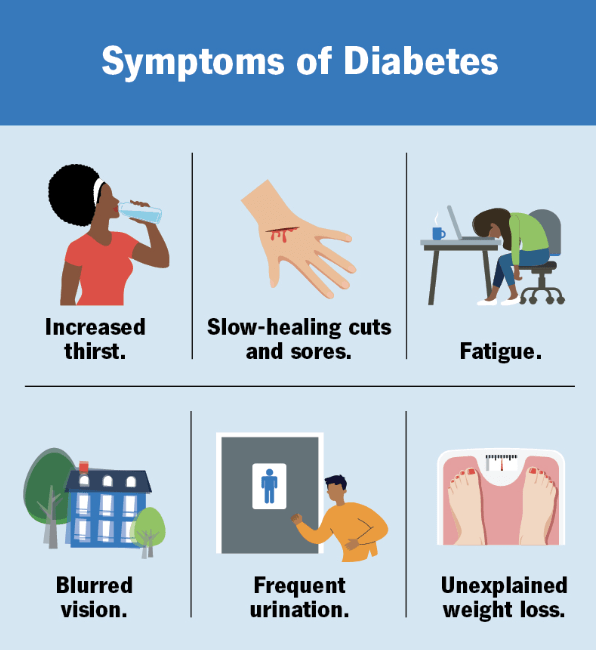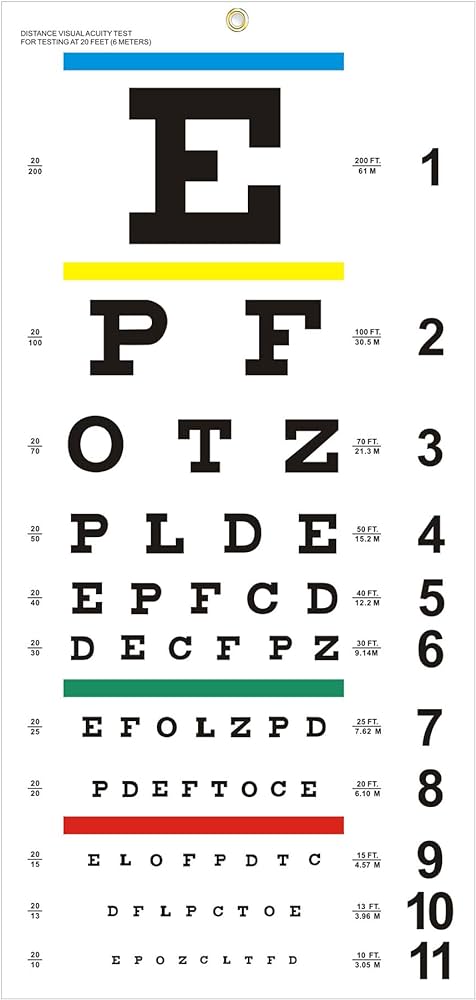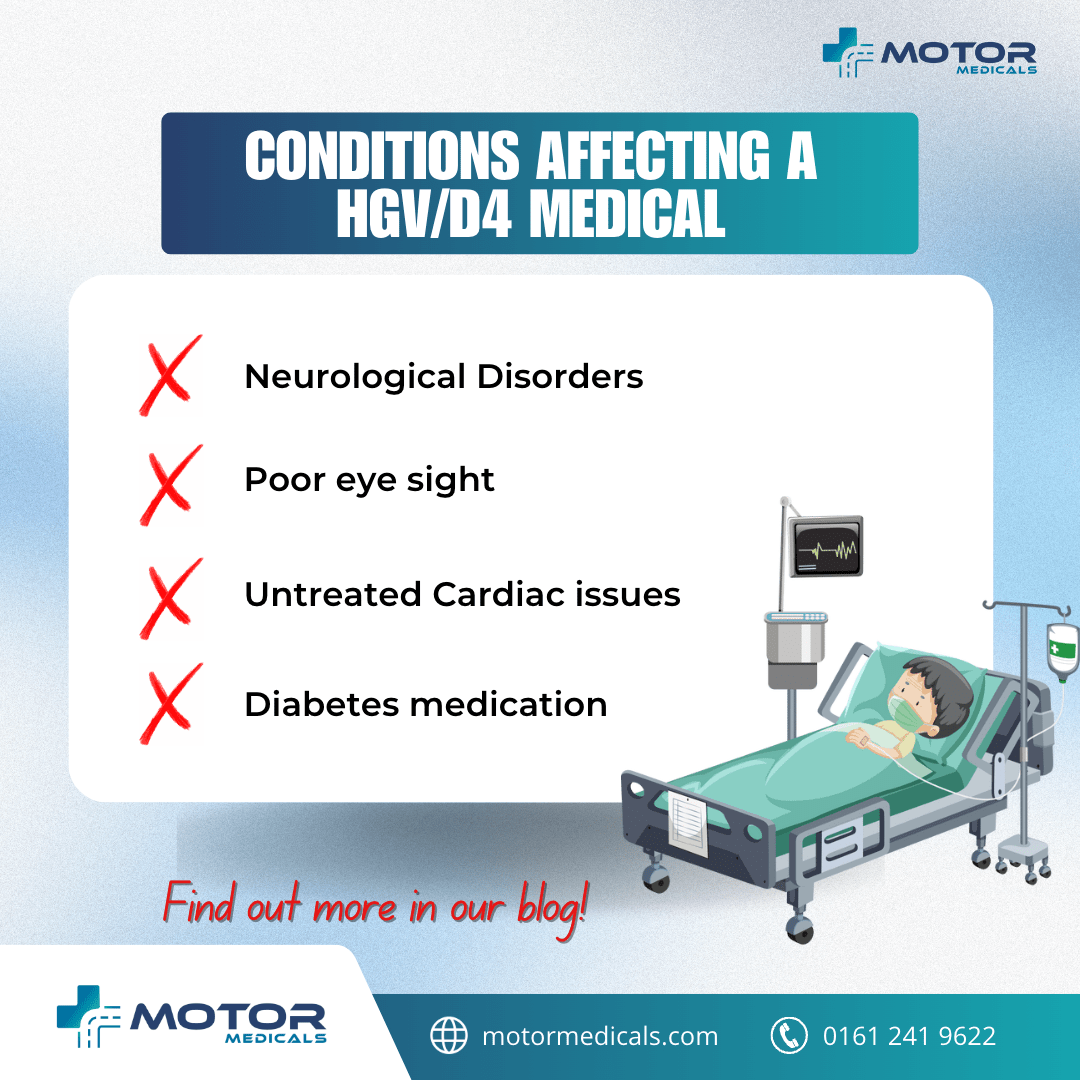Navigating DVLA Health Standards
Understanding how each condition influences the medical exam and knowing how to prepare for it is crucial. At MotorMedicals Ltd, we specialize in offering affordable and efficient medical exams conducted by GMC-registered doctors, ensuring that HGV drivers can continue their journey with confidence. Our services are designed to be fast, with a range of appointment times that include late evenings, and easy booking options available online or by phone, making us the No. 1 medical provider in the UK.
You can call our team on 0161 241 9622 or visit our HGV/D4 Medical page here
Understanding How Medical Conditions Impact Your Certification
1.Diabetes Mellitus
Diabetes: What You Need to Know
Diabetes is a condition that can significantly impact an HGV driver’s ability to pass the D4 medical. Drivers with insulin-treated diabetes must demonstrate strict control and monitoring of their blood glucose levels.
Preparing for Your D4 Medical with Diabetes
On the day of the medical, bring your blood glucose meter, logbook, and any other relevant medical records. This includes having at least six continuous weeks of blood glucose readings available on a traditional blood glucose meter with a memory function. Additionally, drivers must undertake blood glucose monitoring at least twice daily and at times relevant to driving, such as no more than two hours before starting a journey and every two hours while driving. Drivers using sulphonylurea or glinide treatments must also monitor their blood glucose levels meticulously to meet the medical criteria. Additionally, gather all necessary identification documents and your glasses prescription if applicable. A table like the one below may be useful in recording your blood sugar readings
Impact on Your HGV Medical
Failure to meet these requirements can result in failing the D4 medical, affecting the driver’s ability to work. It’s crucial to prepare thoroughly for the medical by maintaining consistent blood glucose records and consulting with healthcare providers. MotorMedicals Ltd can assist drivers by conducting these medical exams efficiently, ensuring all necessary information is meticulously recorded and submitted.
2.Cardiac Issues
Common Cardiac Conditions
Cardiac conditions such as coronary heart disease (CHD), angina, and heart failure are common issues that can affect an HGV driver’s ability to pass the D4 medical. For instance, if you’ve had a coronary artery bypass graft (CABG), you will be ineligible to drive for at least three months post-surgery. Similarly, uncontrolled angina, heart failure, or cardiac arrhythmias can lead to disqualification from holding an HGV licence. Drivers with an implanted cardiac defibrillator or those with untreated hypertension, where the resting blood pressure is consistently 180 mm/Hg systolic or more, or 100 mm/Hg diastolic or more, are also likely to be refused certification.

Why Cardiac Health Matters in HGV Medicals
The physical demands of driving an HGV, combined with the need for constant vigilance, mean that any cardiac condition posing a risk of sudden incapacitation can have severe consequences. Conditions like coronary heart disease (CHD), untreated hypertension, and heart arrhythmias can lead to unexpected episodes of chest pain, dizziness, or even loss of consciousness, endangering not only the driver but also other road users. Ensuring that these conditions are well-managed and stable is essential for passing the D4 medical.
Steps to Take Before Your D4 Medical
Start by scheduling a thorough check-up with your cardiologist to assess your current condition and get professional advice on any necessary treatments. Ensure that your blood pressure is under control and that any issues like angina or heart arrhythmias are being effectively managed with medication or lifestyle changes. Gather all relevant medical records, including recent test results and prescriptions, as these will be necessary for your D4 medical assessment. Additionally, maintain a healthy lifestyle by following a balanced diet, engaging in regular physical activity, and avoiding smoking or excessive alcohol consumption. At your D4 medical appointment, bring all identification documents, a list of your medications, and any other pertinent medical information.
3.Poor Eyesight
Vision Standards for HGV Medicals
Meeting the vision standards for HGV medicals is crucial for ensuring road safety. HGV drivers must be able to read a car number plate from 20 metres in good light, with or without glasses or contact lenses. Additionally, drivers must have a visual acuity of at least 6/7.5 in the better eye and 6/60 in the worse eye using a Snellen chart, which measures distance vision. Drivers who require corrective lenses must ensure that their prescription is no stronger than +8 dioptres in any meridian. For monocular vision, stricter conditions apply, and drivers generally cannot hold an HGV licence unless they meet specific criteria and have prior entitlements. It’s essential to have your vision assessed by a registered optometrist or doctor who can document your visual acuity accurately.
How Poor Vision Affects Your Certification
Poor vision can severely impact your ability to obtain or renew your HGV licence. If you fail to meet the required visual acuity standards, you risk being deemed unfit to drive. These visual impairments can compromise your ability to perceive road hazards, judge distances, and react promptly, posing a risk to both yourself and other road users.

Preparing for Your D4 Medical with Vision Issues
Bring any corrective lenses, such as glasses or contact lenses, to the appointment, as these will be necessary for the vision assessment. Ensure your prescription is up-to-date and does not exceed +8 dioptres in any meridian. On the day of your D4 medical, bring identification documents and your vision assessment records.
MotorMedicals Ltd offers thorough vision assessments included in the HGV/D4 medical, helping you meet the necessary criteria.
4.Neurological disorders
Common Neurological Conditions
Drivers with epilepsy must be seizure-free without medication for at least ten years to be considered fit to drive. Strokes or transient ischemic attacks (TIAs) require a one-year period free of symptoms before reapplication. Conditions like Parkinson’s disease and multiple sclerosis must be well-managed, with no symptoms likely to interfere with safe driving. Unexplained loss of consciousness or severe head injuries with ongoing effects can also disqualify a driver. These conditions can affect cognitive functions, coordination, and reaction times, posing a safety risk on the road.
Impact on HGV Medical Certification
Neurological disorders can profoundly affect your HGV medical certification. Conditions like epilepsy, Parkinson’s disease, and multiple sclerosis often require stringent criteria to be met for a driver to be deemed fit. For example, epilepsy requires a ten-year period without seizures and without medication. Similarly, a stroke or transient ischemic attack necessitates a one-year symptom-free period before reapplication. These disorders can impair cognitive functions, coordination, and reaction times, making it risky to drive an HGV. If you have had unexplained loss of consciousness or severe head injuries with ongoing effects, your certification may be at risk.
How to Prepare for Your D4 Medical with Neurological Disorders
Start by consulting with your neurologist to get a detailed assessment of your condition. Ensure you have all necessary medical records, including treatment history, recent test results, and any notes on your progress. If you have epilepsy, you need to document a ten-year period free of seizures without medication. For conditions like strokes, ensure you have been symptom-free for at least one year. On the day of your medical, be prepared to discuss your condition and how it is managed.
How MotorMedicals Can Help – No1 HGV/D4 Medical Provider
At MotorMedicals Ltd, we specialize in providing thorough and efficient medical examinations for HGV drivers. Our services cover all aspects of the D4 medical, including evaluations for diabetes, cardiac conditions, vision issues, and neurological disorders.
Our team of GMC-registered doctors ensures that each assessment is conducted to the highest standards, with detailed documentation to meet DVLA requirements.
We offer a range of appointment times, including late evenings, to accommodate your busy schedule. Booking is made simple through our online system or via phone. Our goal is to provide affordable medicals without compromising on quality, helping you maintain your certification and continue driving confidently.
With MotorMedicals Ltd, you can be assured of a professional and reliable service that prioritizes your health and career.




